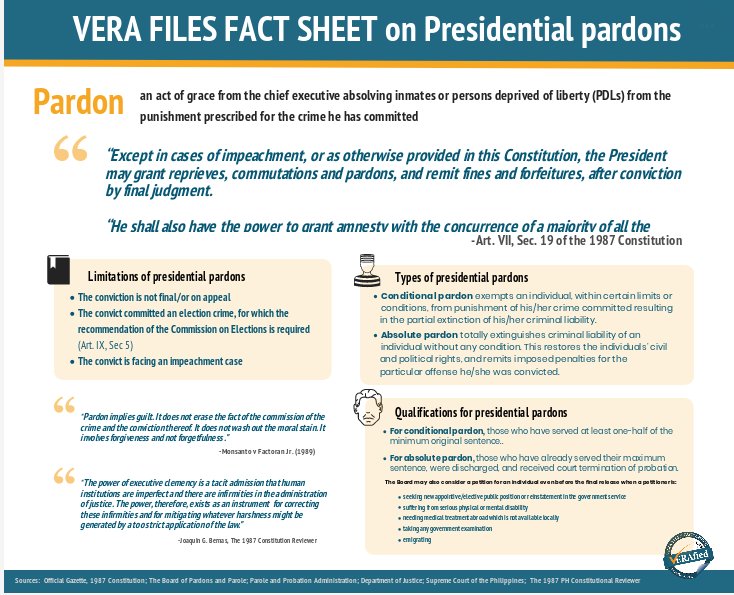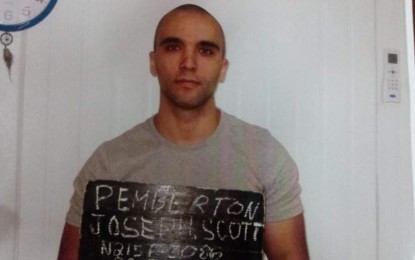On orders of President Rodrigo Duterte, 10 high-profile convicts from the New Bilibid Prison (NBP) in Muntinlupa were transferred to the Philippine Marine Barracks in Fort Bonifacio, Taguig City, citing “threats to their security.”
Seven of these inmates were witnesses in the alleged involvement in the illegal drug trade of Sen. Leila de Lima, who questioned the president’s order as “highly suspicious.”
Duterte defended his decision and even said he pardoned some of them, but did not specify who:
“(Translated from Bisaya) It’s given in the Constitution. The power to commute and to pardon is absolute. May discretion lang. The people I grant pardon to is my responsibility (sic). You do not question because the Constitution says it is an absolute power. It doesn’t involve the Congress. That’s mine alone. “
Source: RTVMalacanang, Groundbreaking Ceremony of the Naga Permanent Housing Project (Speech), Sept. 6, 2019, watch from 22:21 to 23:15
What is a pardon and is it really an absolute power of the president?
Here are five things you should know.
What is a presidential pardon?
A pardon is an act of grace from the chief executive absolving inmates or persons deprived of liberty (PDLs) from the punishment prescribed for the crime he has committed, according to the Department of Justice.
The power to pardon, a form of executive clemency, is given to the president under Art. VII, Sec. 19 of the 1987 Constitution:
“Except in cases of impeachment, or as otherwise provided in this Constitution, the President may grant reprieves, commutations and pardons, and remit fines and forfeitures, after conviction by final judgment.
“He shall also have the power to grant amnesty with the concurrence of a majority of all the Members of the Congress.”
Does the president have “absolute power” to commute sentences and pardon convicts?
No. The power of the president to pardon convicts is not absolute.
Citing the limitations of presidential pardon, lawyer Christian Monsod, one of the framers of the 1987 Constitution, said it cannot be applied under the following circumstances:
-
- The conviction is not final/or on appeal;
- The convict committed an election crime, for which the recommendation of the Commission on Elections is required (Art. IX, Sec 5); and
- The convict is facing an impeachment case.
Monsod said presidential pardon is also subject to the power of judicial review based on the principles of separation of powers, and of checks and balances in the Constitution.
He added that, depending on the facts of each case, pardons are reversible if any of the exceptions to the presidential power is ruled as ultimately valid by the Supreme Court.
What does the grant of presidential pardon mean?
The very essence of pardon is forgiveness or remission of guilt, according to the 1989 Supreme Court ruling Monsanto v Factoran Jr.:
“Pardon implies guilt. It does not erase the fact of the commission of the crime and the conviction thereof. It does not wash out the moral stain. It involves forgiveness and not forgetfulness.”
Joaquin G. Bernas, a member of the 1987 Constitutional Commission, said executive clemency is premised on the “implied admission that there are infirmities and imperfections in the administration of justice.”
This power exists to correct these infirmities and mitigate whatever harshness might be generated by too strict application of the law.
What are the types of presidential pardon?
There are two types of presidential pardon:
-
- Conditional pardon, which exempts an individual, within certain limits or conditions, from punishment of his/her crime committed resulting in the partial extinction of his/her criminal liability; and
- Absolute pardon, which totally extinguishes criminal liability of an individual without any condition. This restores the individuals’ civil and political rights, and remits imposed penalties for the particular offense he/she was convicted.
An absolute pardon is complete even without acceptance, whereas “a conditional pardon has no force until it is accepted by the condemned,” explained by Bernas.
Who may qualify for a presidential pardon?
The Board of Pardons and Parole (BPP) under the Office of the Secretary of Justice reviews applications for parole or conditional pardon and recommends to the president for executive clemency.
PDLs may qualify for pardon if they meet the following condition/s:
-
- For conditional pardon, those who have served at least one-half of the minimum original sentence; and
- For absolute pardon, those who have already served their maximum sentence, were discharged, and received court termination of probation.
The Board may also consider a petition for an individual even before the final release when a petitioner is:
-
- seeking new appointive/elective public position or reinstatement in the government service;
- suffering from serious physical or mental disability;
- needing medical treatment abroad which is not available locally;
- taking any government examination; or
- emigrating.
Sources
RTVMalacanang, Groundbreaking Ceremony of the Naga Permanent Housing Project (Speech), Sept. 6, 2019
Presidential Communications Operations Office, Speech of President Rodrigo Roa Duterte during the Groundbreaking Ceremony and Time Capsule Laying for the Naga Permanent Housing Project, Sept. 6, 2019
Rappler.com, No special treatment in transfer of De Lima witnesses to marine barracks – DOJ, Sept. 6, 2019
ABS-CBN News, Peter Co, 9 other high-profile convicts moved to marine barracks: official, Sept. 5, 2019
CNN Philippines, Some witnesses vs De Lima now out of Bilibid, document shows, Sept. 5, 2019
GMA News Online, De Lima not advised convict-witnesses were transferred out of NBP —lawyer, Sept. 6, 2019
Leila De Lima Official Facebook page, Dispatch from Crame No. 588, Sept. 6, 2019
Department of Justice, 2003 Accomplishment Report
Official Gazette, 1987 Constitution
Castañeda, A.L.F (2001), The Origins of Philippine Judicial Review, 1900-1935
Bernas, Joaquin, G. (2011), The 1987 Philippine Constitution: A Comprehensive Reviewer, pp. 319-321
BusinessMirror, ‘Pardon and amnesty’, Oct. 8, 2018
ABS-CBN News, ALAMIN: Ano ang presidential pardon?, July 25, 2018
Parole and Probation Administration, FAQ on Parole/Executive
Parole and Probation Administration, Annexes
Personal communication with Atty. Christian Monsod, Sept. 16, 2019
Lawphil.net, G.R. No. 78239
Chan Robles Law, G.R. No. 78239
(Guided by the code of principles of the International
Fact-Checking Network at Poynter, VERA Files tracks the false claims,
flip-flops, misleading statements of public officials and figures, and
debunks them with factual evidence.
Find out more about this initiative and our methodology.)


